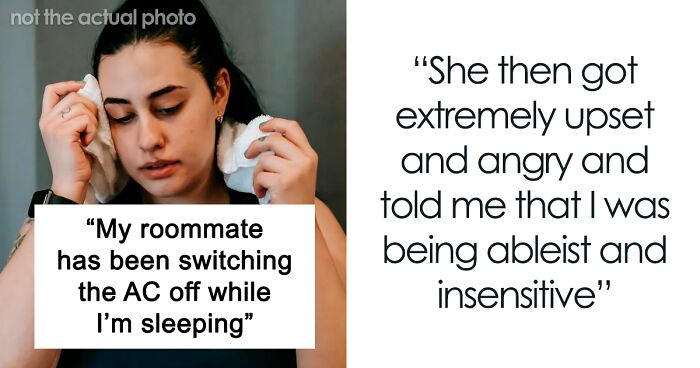
“AITA For Telling My Roommate That Her Anorexia Is Not My Problem?”
Interview With ExpertIf you live in a hot place, air conditioning is your savior in the summer. Some people might prefer to suffer through the heat, but sweating non stop is neither enjoyable nor necessary when we live in a time of modern conveniences.
That’s why one woman prefers to keep the A/C running in her apartment 24 hours a day when it’s warm out. But her roommate believes it’s insensitive to her eating disorder recovery to keep the cold air blasting. Below, you’ll find the full story that was posted on the “Am I the [Jerk]?” subreddit, as well as a conversation with Richard Palmer, Founder and Clinical Lead at The Eating Disorder Recovery Clinic.
Air conditioning is a godsend for those who live in hot climates
Image credits: cottonbro studio / pexels (not the actual photo)
This woman is tired of waking up sweaty because her roommate keeps turning the A/C off
Image credits: OlgaGubskaya / envato (not the actual photo)
Image credits: benzpls
Sleep experts recommend keeping our bedrooms cool at night
If you live in a cold place, you may have easily lived your entire life without air conditioning. Perhaps you pull out a fan for a few days in the summer, but for the most part, your home is either comfortable or in need of heating. But as someone who lived 18 years in South Texas, I can say that cool air is a necessity for many people around the globe.
The woman in this story noted that temperatures have been in the 90s (F) where she lives recently (32-37°C), which is certainly warm enough to be sweating. In fact, according to the World Health Organization, heat is a common environmental and occupational health hazard. Especially today, with climate change, hot weather is becoming more and more dangerous.
WHO reports that heat-related deaths in seniors increased by about 85% between 2000-2004 and 2017-2021. And between 2000 and 2019, about 489,000 people died due to excess heat. Nearly half of these deaths occurred in Asia, while 36% took place in Europe. Considering that a person’s internal body temperature only needs to reach 104°F (40°C) to have a heat stroke, it’s important to take the dangers of hot weather seriously when temperatures reach the 90s.
When it comes to temperatures at night time, the Sleep Foundation says that the ideal temperature to sleep in is between 65-68°F (18-20°C). And getting a good night’s sleep in a hot room can be nearly impossible. Warm temperatures can cause us to become restless and feel sweaty and dehydrated while trying to doze off. A hot bedroom might also “interfere with the body’s thermoregulation abilities and cause fatigue,” the sleep experts note.
Image credits: Ivan Oboleninov / pexels (not the actual photo)
“It’s normal for people with anorexia to have a reduced core body temperature and therefore be more susceptible to the temperature of their environment”
But this story is about more than just the air conditioner argument. To learn more about the process of recovering from anorexia, we reached out to Richard Palmer, Founder and Clinical Lead at The Eating Disorder Recovery Clinic. Richard was kind enough to have a chat with Bored Panda and explain why those struggling with anorexia often feel cold.
“This happens for a variety of reasons, but there are two main reasons. Firstly, people with anorexia can have a significantly reduced body fat percentage,” Richard noted. “Body fat is crucial for insulation and regulating body temperature, meaning that individuals with a reduced body fat percentage struggle to maintain their body temperature.”
“Secondly, our core body temperature comes from metabolising energy – we create our own heat by burning energy stores. In anorexia, the body is trying to preserve as much energy as possible so it reduces the individual’s metabolism – reducing the amount of heat being produced,” he explained. “It’s normal for people with anorexia to have a reduced core body temperature and therefore be more susceptible to the temperature of their environment.”
We were also curious about what the journey of recovering from anorexia is typically like. “[It] is rarely straightforward,” the expert says. “Research shows that, on average, recovery takes around 10 years – although it can be shorter or longer depending on someone’s individual circumstances. Recovery usually requires a mixture of therapy, dietitian support and medical support, although the amount of each will vary. We have some clients who only need to work with their therapist and have occasional health monitoring. Other clients have multiple appointments a week with a number of professionals.”
Richard also noted that it is exceptionally common for someone in recovery to be irritable. “Again, there are several reasons for this. Firstly, as the brain is starved of nutrients it reduces function,” he explained. “Comfortable emotions, such as happiness, are not necessary for survival and so can be reduced to save energy. Other emotions, such as anxiety and anger, are necessary for survival and so the brain will keep them going.”
“Secondly, recovery involves letting go of eating disorder behaviors,” the expert shared. “We tend to view eating disorders as coping mechanisms. As the individual lets go of their anorexia, they have to learn how to cope with situations and experiences that the anorexia was originally keeping them safe from.”
“Thirdly, but similar to the second reason, during therapy the individual will be encouraged to work on resolving the underlying causes for their anorexia. This often means working through significant trauma which can take months, sometimes years, to process,” Richard noted. “It is entirely normal for the individual to be left holding a lot of powerful emotions between sessions which can, unfortunately, come out at the people around them.”
“Everyone’s recovery journey is unique; flexibility, empathy and open communication are essential”
Richard also says social support from friends and family are vital during recovery. “They make the process much quicker and easier, but we understand that it’s not an easy role to take. There are a number of things people can do to support someone in recovery: Education yourself – learn about the nature of eating disorders, read accounts from people who are/have been in recovery to help you understand what living with anorexia is like (picture being in a 24/7 365 day a year battle with your brain. You get no rest, no break from it. Your brain is bullying you relentlessly – that is what having anorexia is like).”
The expert also recommends keeping in mind that recovery isn’t linear. “There will be ups and downs. Some days will be better than others, and this is normal. Try to avoid judgement or criticism, especially on the down days,” he noted.
Next, Richard says it’s important to talk to the individual and find out from them what they need from you. “This doesn’t mean that you have to give them everything – it’s important to take care of yourself too – but keep in mind that there is no such thing as a typical case of anorexia,” he told Bored Panda. “What works and helps one person will make another person worse. Talk to the person you’re supporting and discuss how you’re both feeling and what you need from each other. Try to not let resentments bottle up because that’s when they can explode out and knock someone backwards in recovery.”
“It’s so important to keep in mind that everyone’s recovery journey is unique. Flexibility, empathy and open communication are essential,” Richard added. “It’s also essential that anyone who is supporting someone with an eating disorder also takes care of themselves. It’s a long, hard journey and it can take its toll on you. Boundaries, self-care and personal support are really important to maintaining your own mental health while supporting someone else.”
We would love to hear your thoughts on this situation, pandas. Then, if you’re interested in checking out another Bored Panda piece discussing similar drama, look no further than right here!
Many readers agreed that the woman should be allowed to keep the A/C on
However, some thought that the woman was being insensitive to her roommate
Poll Question
Thanks! Check out the results:
Explore more of these tags
"YTA - your heat sensitivity is not her problem." Wtf? And the roommate's cold sensitivity is not the OP's problem! YTA comments are wild.
Also "drink a glass of cold water"?! That doesn't work in very hot (and possibly humid) climates, and won't let OP get a full night's sleep.
Load More Replies...It is easier to wear more clothes and cover up with multiple blankets to stay warm. Than it is to stay cool. You can take of all your clothes and be naked, and you still won't be cool if it's hot in the room. You won't be comfortable unless you have air conditioning. Knowing this, I would definitley allow the air conditioning to be on full blast for my roommate. Regardless, if I was suffering from anorexia or not. Because again it's easier for me to bundle up and stay warm.
My office mates were always cold even in summer and insisted the a/c be kept at 73. My office faced the rising sun (which is early in summer in Washington State) so by the time I got to work, my office was boiling hot. I started wearing shorts to work. Finally I told my bosses I was coming to work in my underwear unless something was done about my office. My boss got me a portable a/c unit that was on the floor and blew directly on me. He'd turn it on when he got to work so my office was already cooling down.
Load More Replies..."YTA - your heat sensitivity is not her problem." Wtf? And the roommate's cold sensitivity is not the OP's problem! YTA comments are wild.
Also "drink a glass of cold water"?! That doesn't work in very hot (and possibly humid) climates, and won't let OP get a full night's sleep.
Load More Replies...It is easier to wear more clothes and cover up with multiple blankets to stay warm. Than it is to stay cool. You can take of all your clothes and be naked, and you still won't be cool if it's hot in the room. You won't be comfortable unless you have air conditioning. Knowing this, I would definitley allow the air conditioning to be on full blast for my roommate. Regardless, if I was suffering from anorexia or not. Because again it's easier for me to bundle up and stay warm.
My office mates were always cold even in summer and insisted the a/c be kept at 73. My office faced the rising sun (which is early in summer in Washington State) so by the time I got to work, my office was boiling hot. I started wearing shorts to work. Finally I told my bosses I was coming to work in my underwear unless something was done about my office. My boss got me a portable a/c unit that was on the floor and blew directly on me. He'd turn it on when he got to work so my office was already cooling down.
Load More Replies...
 Dark Mode
Dark Mode 

 No fees, cancel anytime
No fees, cancel anytime 







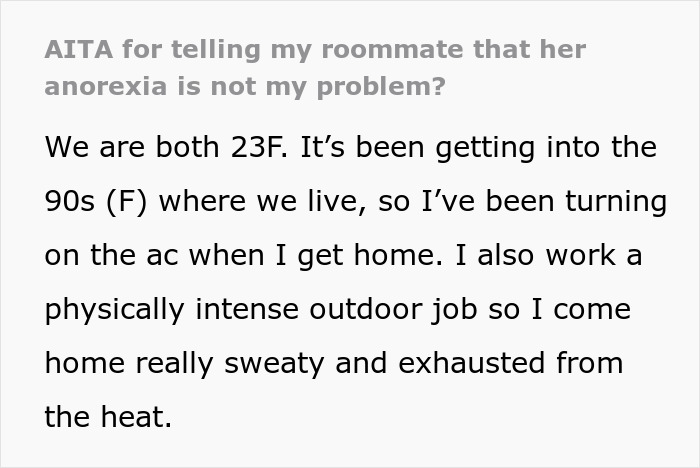

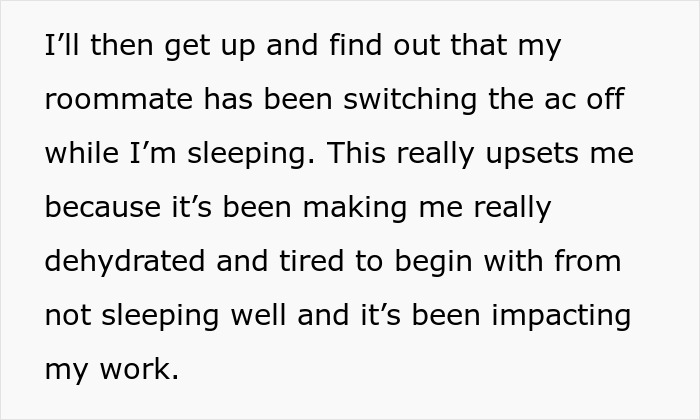
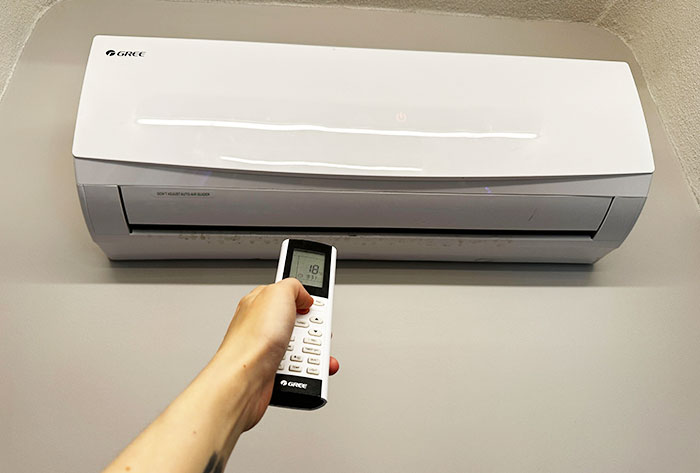

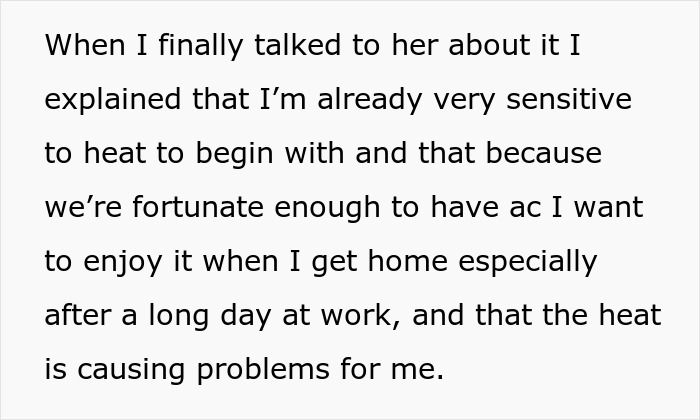
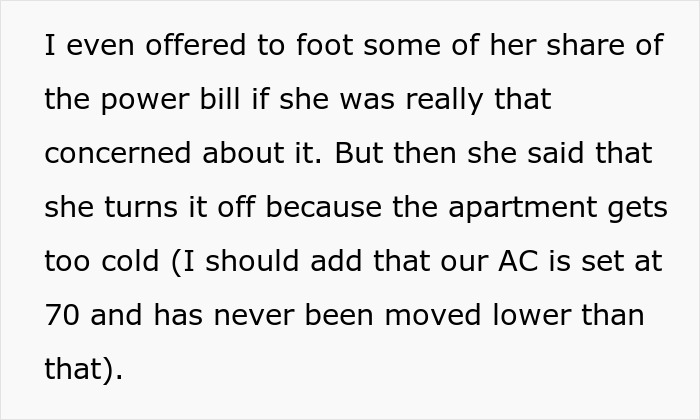
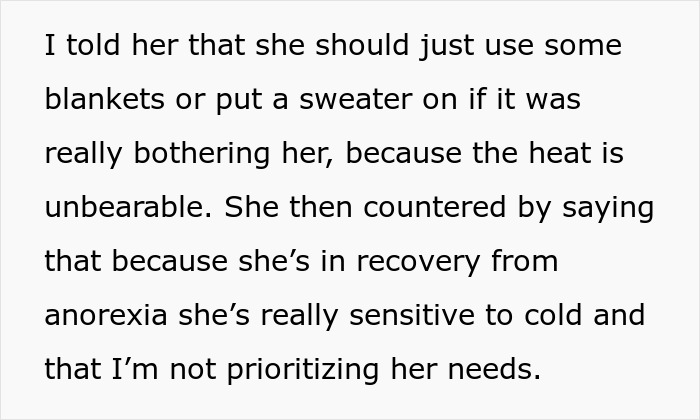

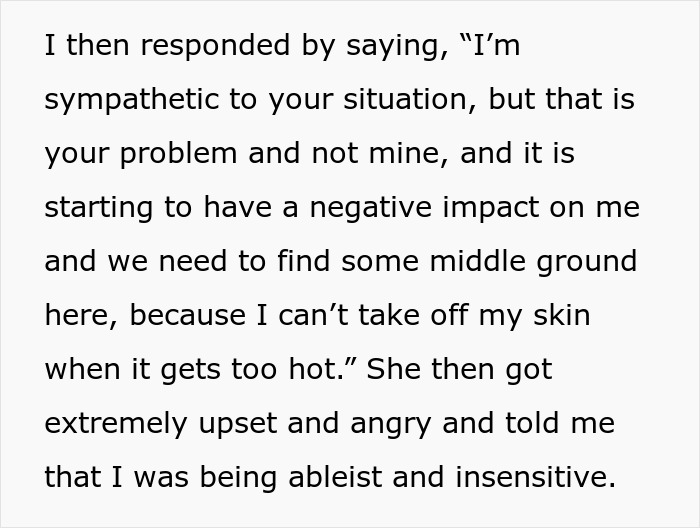

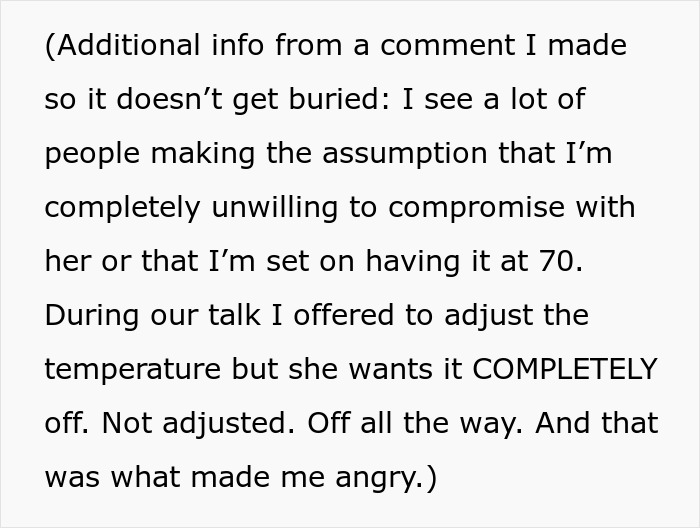

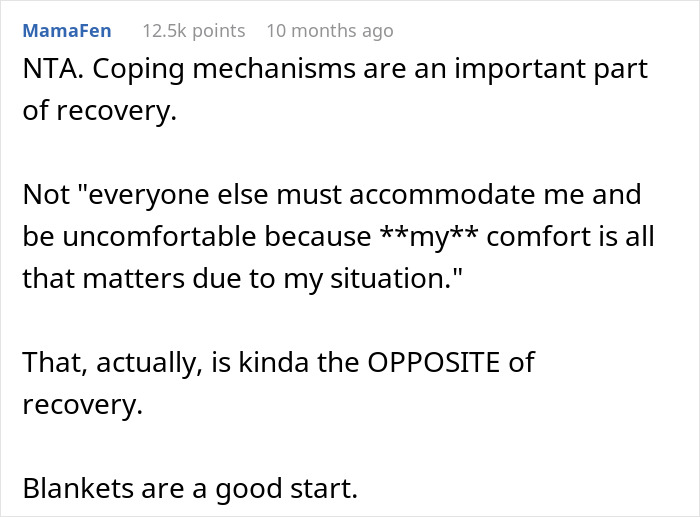
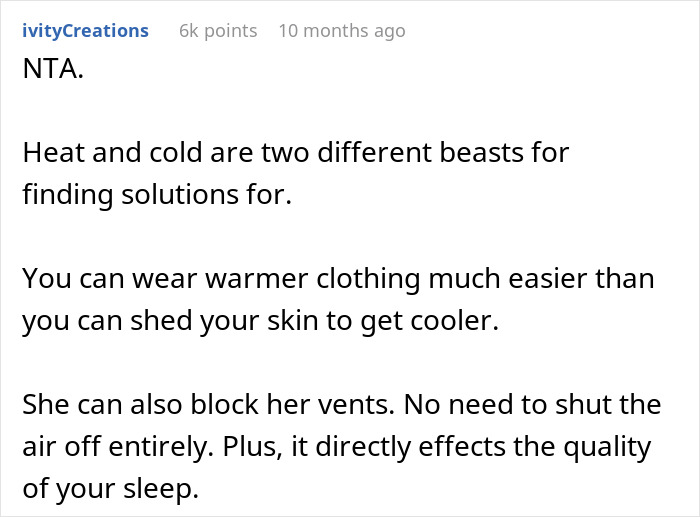

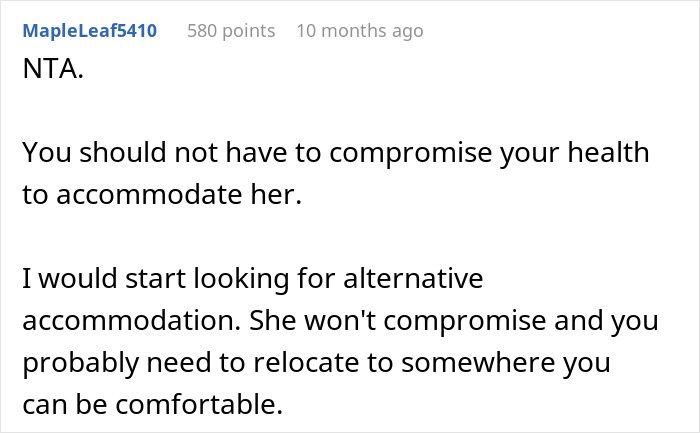


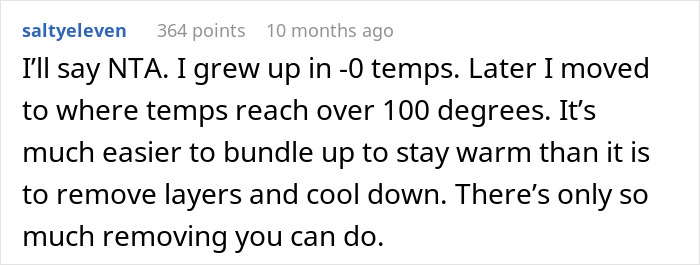
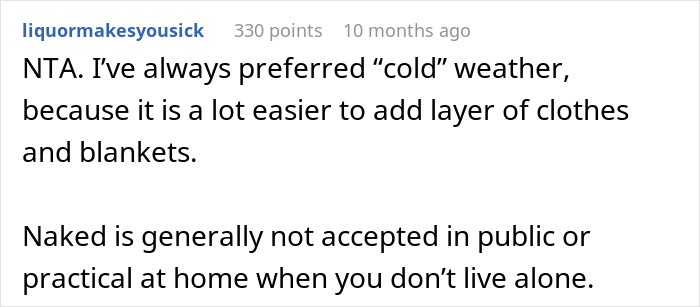

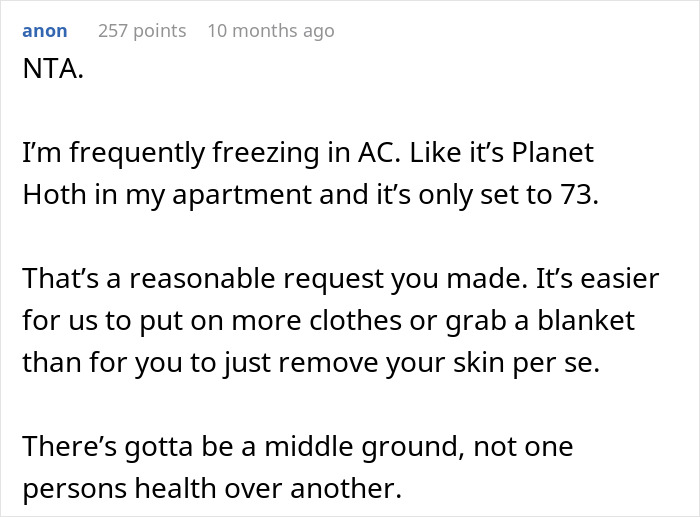
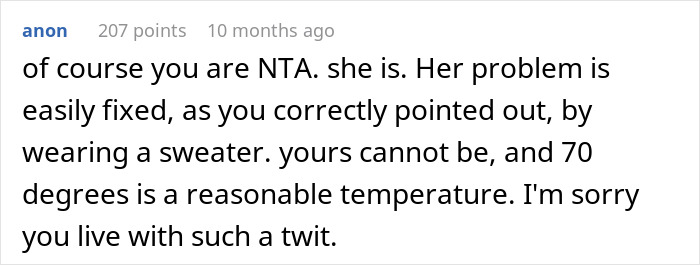
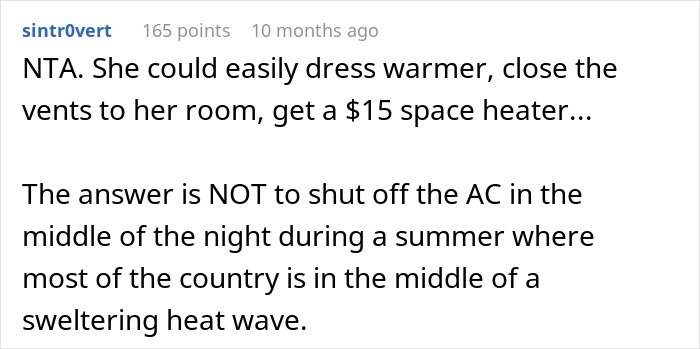

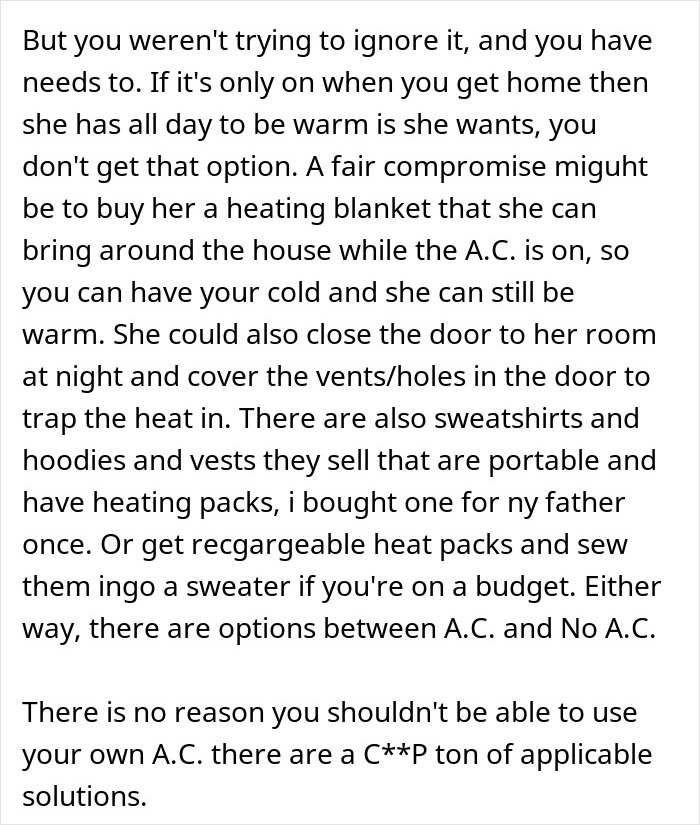


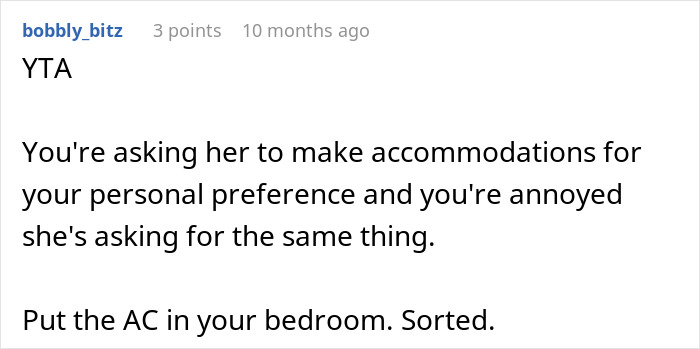
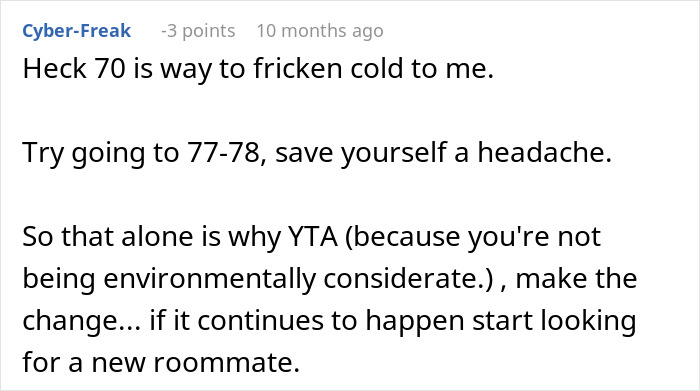












































6
75